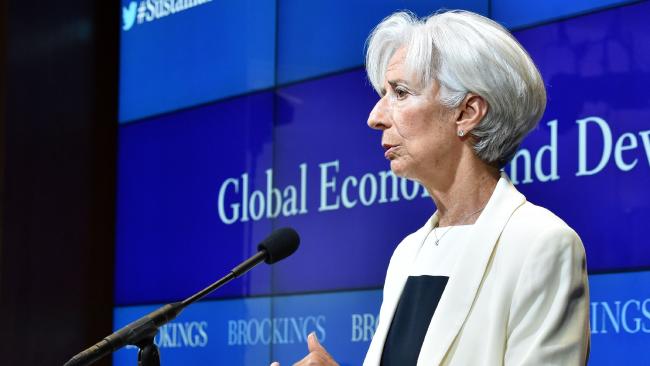Economy
Gulf nations need to bring in radical tax reforms, must introduce tax soon: IMF chief
Gulf states should try to introduce radical tax and spending reforms, remarked International Monetary Fund (IMF) chief Christine Lagarde.

Gulf states should try to introduce radical tax and spending reforms, remarked International Monetary Fund (IMF) chief Christine Lagarde.
Low oil prices have slashed state revenues in the six-nation Gulf Cooperation Council (GCC). All of the countries have begun to restrain spending, but most have so far hesitated to take politically sensitive steps that would directly reduce consumers’ disposable income.
At a meeting with GCC finance ministers in Doha, IMF managing director Christine Lagarde said governments needed to do more to get their budget deficits under control.
She urged governments to slow growth of their current spending, taking aim at their practice of giving cushy, high-paying jobs to their citizens to ensure political support. Most employed GCC citizens work for the public sector.
“Given the new fiscal realities, there is not room for public wage bills to grow further. We have to face that reality,” Lagarde said in a statement after the meeting.
She also urged GCC countries, including Saudi Arabia and the United Arab Emirates, to introduce a regional value-added tax (VAT) as soon as possible. That reform should not be delayed, she said.
The six governments have been debating the introduction of VAT for years but have so far not agreed to act. Officials have said that to limit smuggling and damage to economies’ competitiveness, the tax would probably have to be introduced regionally rather than by individual nations at different times.
The IMF’s public pressure for budget reforms in the Gulf could help governments justify controversial measures to their populations, civil services and the business community.
The GCC states are under different degrees of financial pressure from low oil prices. The United Arab Emirates has such huge fiscal reserves that it is relatively comfortable, but it has been proactive in cutting spending, for example by reducing domestic gasoline subsidies in August.
Saudi Arabia looks much more vulnerable. The IMF estimates it is running an annual budget deficit of over $100 billion, and it has hesitated to make controversial reforms, though it has said it is considering them.
Lagarde said most but not all GCC countries had introduced fiscal policies which would allow them to make adjustments from a position of strength, limiting the impact on their economic growth rates.
“Those who have not done it can certainly learn from those who have,” she said without naming individual countries.
She also warned GCC governments that their spending on public investment projects would have to become more careful and efficient. While they could issue debt to finance deficits, she said, they would have to make sure this did not suck funds away from the private sector.
Money market rates across the region have risen sharply in the last few months as low oil prices reduce the flow of new money into banks, and as the banks anticipate they may have to buy large amounts of government bonds for years to come.
-

 Banking & Finance2 months ago
Banking & Finance2 months agoOman Oil Marketing Company Concludes Its Annual Health, Safety, Environment, and Quality Week, Reaffirming People and Safety as a Top Priority
-

 News2 months ago
News2 months agoJamal Ahmed Al Harthy Honoured as ‘Pioneer in Youth Empowerment through Education and Sport’ at CSR Summit & Awards 2025
-

 Economy2 months ago
Economy2 months agoPrime Minister of India Narendra Modi to Visit the Sultanate of Oman on 17-18 December
-

 OER Magazines2 months ago
OER Magazines2 months agoOER, December 2025
-

 News1 month ago
News1 month agoAI Security Conference 2025 Hosted by Securado Highlights the Changing Cybersecurity Landscape
-

 Insurance1 month ago
Insurance1 month agoSupporting Community Wellness: Liva Insurance Sponsors Muscat Marathon 2026 with Free Health Checkups
-

 Interviews4 weeks ago
Interviews4 weeks agoEXCLUSIVE INTERVIEW: TLS Rebranding Marks Strategic Leap Toward Innovation, Sustainability & Growth
-

 Insurance3 weeks ago
Insurance3 weeks agoLiva Insurance Supports Community Wellness Through “Experience Oman – Muscat Marathon 2026”






























You must be logged in to post a comment Login